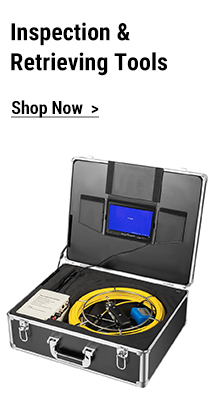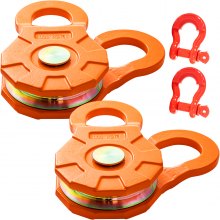VEVOR Snatch Blocks: Precision, Power, and Performance in Every Lift
In off-roading circles, you might be familiar with the concept of a snatch block. A snatch block is a type of pulley made especially to assist you in freeing your vehicle or SUV from a treacherous or slick condition.
VEVOR Snatch Blocks are the pinnacle of heavy-duty operations, offering a lifting experience above and beyond what is often expected. As we explore the nuances of these state-of-the-art instruments, get ready to see a revolution in your lifting pursuits.
What is a Snatch Block?
A snatch block is a specific kind of heavy-duty pulley block that offers a robust and adaptable mechanical advantage for lifting and rigging big objects. It is also referred to as a snatch pulley or snatch block pulley.
They usually operate in tandem with winches during vehicle recovery. They can also be used for other tasks, including hauling small cars, lifting and hoisting heavy things, and removing debris from roads and other areas.
A snatch block adds a second element that offsets the anchor point when a pulley system is configured to pull heavy objects. This makes it possible to pull in a three-point motion, which changes the cable's direction and requires less force overall, improving process efficiency.
How to Use a Snatch Block
A snatch block needs a few steps beyond those found in a typical winch recovery. The snatch block mainly offers an alternative method of mounting the winch line.
Open the Metal Casing
Based on the sort of snatch block you have, there are numerous ways to do this. For some to open, you have to remove a wire pin from the sheave bolt; for others, you have to unscrew the sheave bolt all the way. Ensure you follow the instructions on opening these mechanisms without taking them apart entirely.
Thread Wire Rope
The next process, called "reeving," is to thread the wire rope through after it has been opened. Wrap the wire rope around the sheave a few times to secure it.
Close the Metal Casing
Once the rope is positioned as desired within the sheave, tighten the metal casing by pulling the bolt or replacing the pin.
When Should I Use a Snatch Block?
A snatch block should be employed during winch recoveries when overcoming an obstruction or recovering a stranded vehicle will need more effort than a conventional straight-line pull. The most typical instances of this are as follows:
- When the winch line must be redirected to reach your anchor point because it is so far off to the side, because winches are so intense when used in a straight line, we can still harness their power by utilizing a snatch block. There are many winch circumstances where winch line redirection can be applied, such as tactical track control and obstacle avoidance.
- Sometimes, the force generated by your winch won't be sufficient to free the locked car. A well-known illustration of this is a car that gets stuck in deep mud and must be extracted using strong suction from the ground.
In this scenario, we should consider employing a more sophisticated recovery method, like a double- or triple-line pull, to improve the likelihood of a successful and safe recovery.
What is the Difference Between the Pulley Block and the Snatch Block?
Both snatch blocks and pulley blocks are types of lifting tools with an axle and wheel that can support up to 30 tons of weight. By doubling the number of lines, pulley blocks can improve a hoist or winch's line pull or lifting capability.
They also provide direction to the rope when it is loaded. The grab block is made to release with a gate on the side to make it simple to fit the wire rope, whereas a pulley block is permanently closed and requires the line to pass through the axle.
Snatch blocks and pulleys will both assist you in making lifting procedures easier. There is no particular reason to purchase one over the other; instead, people select the one that best suits their needs, frequently due to personal choice.
A snatch block can greatly boost a winch's power when used in tandem, making the winching operation more effortless and smoother. The market will have a wide variety of blocks for you to choose from.
Why Choose VEVOR Snatch Blocks?
Selecting VEVOR Snatch Blocks is a commitment to unparalleled quality and performance, not simply a choice. These blocks are the epitome of durability, made with precision engineering to guarantee a dependable lifting experience.
VEVOR Snatch Blocks' cutting-edge design improves effectiveness while providing unmatched power and control. VEVOR distinguishes itself with a dedication to quality by placing a high value on safety and dependability while satisfying the needs of the trickiest lifting jobs.
As you know, VEVOR Snatch Blocks are reliable for those looking for power, accuracy, and unparalleled performance in every lift; you may confidently elevate your operations.
FAQs About Snatch Blocks
How do snatch blocks enhance lifting operations?
Snatch blocks make it simpler to carry large objects by increasing lifting capacity and changing a line's direction. They offer flexibility in rigging configurations and lessen the load on the winch or hoist.
How do I determine the right size of snatch block for my application?
Think about things like the rope diameter, the intended mechanical advantage, and the load weight. To assist customers in selecting the right snatch block for their particular requirements, VEVOR offers guidelines and criteria.
Are there any safety tips for using snatch blocks?
To improve safety during lifting activities, always adhere to manufacturer standards, do routine equipment inspections, employ the proper safety precautions, and ensure the load is appropriately distributed.
What maintenance is required for VEVOR Snatch Blocks?
Maintaining the functionality and lifespan of VEVOR Snatch Blocks requires routine wear and tear inspections, lubricating moving parts, and appropriate storage.


































































































